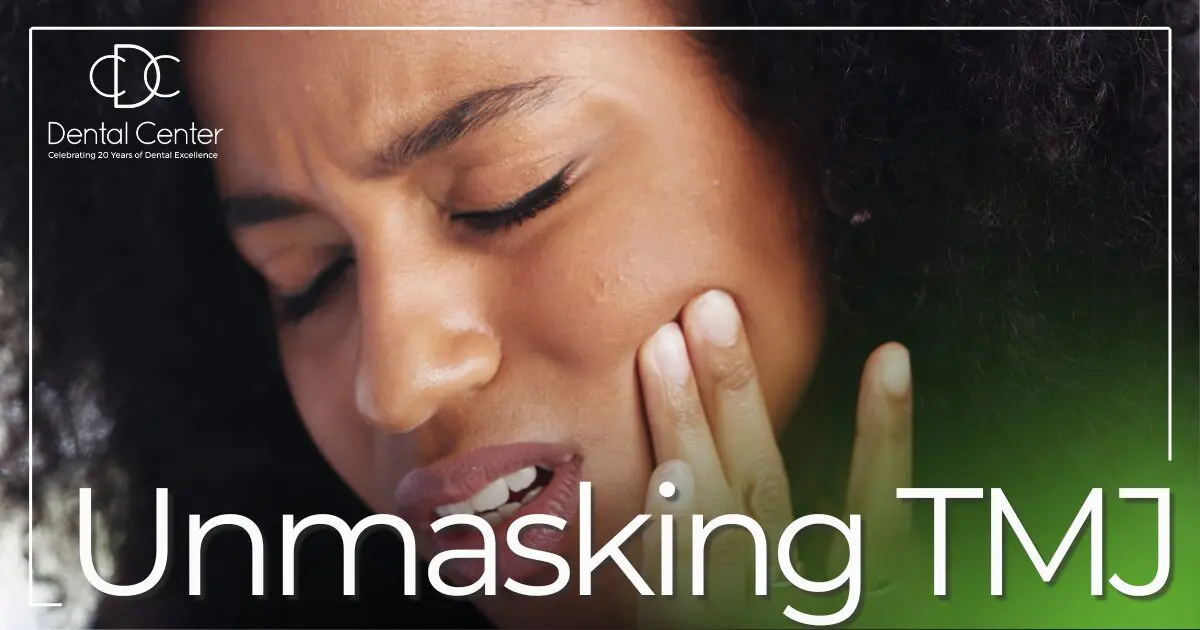When Jaw Pain Isn’t Just Jaw Pain: Understanding TMJ Disorders
Most people have experienced jaw pain at some point—maybe after chewing gum for too long or waking up from a stressful night of clenching their teeth. But when discomfort lingers, spreads, or keeps coming back, it may not just be jaw pain. It could be a sign of a temporomandibular joint disorder (TMJ or TMD). We often have patients who come in thinking they just have a sore jaw, only to learn that their symptoms are part of a larger issue. Keep reading to learn more.
What Exactly Is TMJ?
Understanding TMJ disorders early can help you take control of your oral and overall health before a minor ache turns into a long-term problem. The temporomandibular joint (TMJ) is the hinge that connects your lower jaw to your skull, allowing you to move your jaw smoothly when you eat, talk, or yawn. When this joint is functioning properly, you hardly notice it. But when it’s strained, misaligned, or inflamed, even simple movements can trigger pain and discomfort.
Common Symptoms That Go Beyond the Jaw
TMJ disorders often affect more than just the jaw, and the symptoms can show up in surprising ways. Recurring headaches or migraines, for example, may actually be caused by jaw tension. You might also notice clicking, popping, or even moments when your jaw feels “stuck,” which are common signs of TMJ issues. Because the jaw joint is so close to the ears, inflammation can lead to earaches or ringing. Muscle strain from clenching or grinding often radiates to the face, neck, and shoulders, and pain while chewing or avoiding certain foods can indicate that your jaw isn’t functioning properly.
Why You Shouldn’t Ignore Jaw Pain
It’s easy to dismiss jaw pain as stress or a minor annoyance, but untreated TMJ disorders can get worse over time. If left unchecked, TMD may lead to worn or cracked teeth from grinding, chronic pain that affects your sleep, work, and daily life, and long-term changes in how your bite fits together. The good news is that the sooner TMJ issues are identified, the easier they are to treat, making early evaluation key to preventing more serious complications.
What Causes TMJ Disorder?
Several factors can contribute to TMJ disorder. Stress and teeth grinding (bruxism) are common culprits, as is bite misalignment. Arthritis in the jaw joint or previous injury or trauma can also play a role. Because the causes of TMD vary from person to person, treatment plans need to be carefully tailored to each individual to address the underlying issues effectively.
Finding Relief: Treatment Options
We focus on personalized solutions that address the root of your problem. Depending on your needs, treatment may include:
- A custom oral appliance (nightguard or splint) to reduce clenching
- Bite adjustments to reduce stress on the joint
- Relaxation techniques and stress management strategies
- Conservative therapies to restore balance and function
Our goal isn’t just temporary pain relief; it’s lasting comfort and improved jaw health.
When to Call the Dentist
You should consider scheduling an appointment if you experience:
- persistent jaw pain that doesn’t improve with rest
- frequent headaches that may be linked to jaw tension
- clicking, popping, or locking of the jaw joint
- pain while chewing, biting, or opening your mouth wide
You don’t have to live with uncertainty or discomfort; a proper evaluation can determine whether your jaw pain is simply minor or part of a TMJ disorder that requires treatment.
Take the Next Step Toward Relief
Your smile is more than your teeth; it’s part of a larger system that affects your overall well-being. Jaw pain may seem minor, but TMJ disorders can impact many aspects of your daily life.
We’re here to listen, evaluate, and provide care that addresses the root cause, not just the symptoms. If you’ve been struggling with jaw discomfort or related issues, don’t wait any longer. Call our office located in Chesterfield, MI, and let us help you find the solution so you can enjoy comfort, function, and confidence every day.











